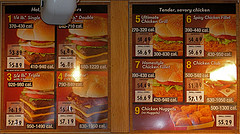
Photo by Flickr user Ed Yourdon under Creative Commons
We wrote on Monday about the numerous benefits of calorie labeling on health and consumer choices. Here’s an update on how the debate is unfolding throughout the intertubes. Blogger Ezra Klein has a print piece in today’s Washington Post praising calorie labeling as a way to wean Americans off foods that will increase our waist size and most likely kill us. An excerpt:
But will putting calorie counts where we can see them make a difference? Possibly. Early studies, along with some anecdotal evidence, show that this practice is driving eaters to choose lighter items.
We’re still waiting for the full data from New York’s experiment. But the researchers there shared unpublished numbers with the County of Los Angeles Public Health Department, which was preparing an analysis in case Los Angeles wanted to follow New York’s lead. Based on those numbers, Los Angeles researchers settled on a “conservative” estimate: 10 percent of chain restaurant patrons would order meals that were merely 100 calories lighter.
Surprisingly, that mild change in behavior has a huge and immediate effect: It would avert 38.9 percent of the county’s expected weight gain in the next year. If 20 percent of patrons order meals with 150 fewer calories, it would avert 116 percent of the expected weight gain, which is to say that the County of Los Angeles would actually lose weight.
On his blog, Matt Yglesias agreed, but argued that “what seems really wrongheaded about the NYC law is to limit its effect to chain restaurants.” Atrios responded that New York’s labeling law is limited to chain restaurants because “requiring it of every restaurant for every item would really place a really large burden on small establishments.” He added, “It’s more reasonable for large chains because their menu items are standardized and the cost can be spread over their entire chain.
So the netroots seems to agree that calorie labeling is beneficial. But is it appropriate to force it on some restaurants, and let others off the hook?














